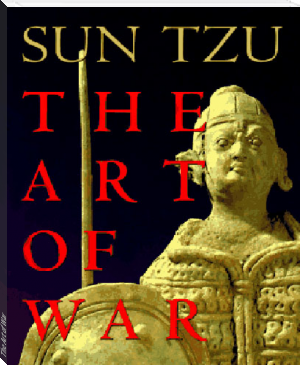The Art of War, Zi Sun [best book recommendations TXT] 📗

- Author: Zi Sun
- Performer: 0976072696
Book online «The Art of War, Zi Sun [best book recommendations TXT] 📗». Author Zi Sun
17. Without subtle ingenuity of mind, one cannot make
certain of the truth of their reports.
[Mei Yao-ch`en says: "Be on your guard against the
possibility of spies going over to the service of the enemy."]
18. Be subtle! be subtle! and use your spies for every kind
of business.
[Cf. VI. ss. 9.]
19. If a secret piece of news is divulged by a spy before the time is ripe, he must be put to death together with the man to whom the secret was told.
[Word for word, the translation here is: "If spy matters are heard before [our plans] are carried out," etc. Sun Tzu's main point in this passage is: Whereas you kill the spy himself "as a punishment for letting out the secret," the object of killing the other man is only, as Ch`en Hao puts it, "to stop his mouth" and prevent news leaking any further. If it had already been repeated to others, this object would not be gained. Either way, Sun Tzu lays himself open to the charge of inhumanity, though Tu Mu tries to defend him by saying that the man deserves to be put to death, for the spy would certainly not have told the secret unless the other had been at pains to worm it out of him."]
20. Whether the object be to crush an army, to storm a city, or to assassinate an individual, it is always necessary to begin by finding out the names of the attendants, the aides-de- camp,
[Literally "visitors", is equivalent, as Tu Yu says, to "those whose duty it is to keep the general supplied with information," which naturally necessitates frequent interviews with him.]
and door-keepers and sentries of the general in command. Our spies must be commissioned to ascertain these.
[As the first step, no doubt towards finding out if any of
these important functionaries can be won over by bribery.]
21. The enemy's spies who have come to spy on us must be sought out, tempted with bribes, led away and comfortably housed. Thus they will become converted spies and available for our service. 22. It is through the information brought by the converted spy that we are able to acquire and employ local and inward spies.
[Tu Yu says: "through conversion of the enemy's spies we learn the enemy's condition." And Chang Yu says: "We must tempt the converted spy into our service, because it is he that knows which of the local inhabitants are greedy of gain, and which of the officials are open to corruption."]
23. It is owing to his information, again, that we can
cause the doomed spy to carry false tidings to the enemy.
[Chang Yu says, "because the converted spy knows how the
enemy can best be deceived."]
24. Lastly, it is by his information that the surviving spy can be used on appointed occasions. 25. The end and aim of spying in all its five varieties is knowledge of the enemy; and this knowledge can only be derived, in the first instance, from the converted spy.
[As explained in ss. 22-24. He not only brings information himself, but makes it possible to use the other kinds of spy to advantage.]
Hence it is essential that the converted spy be treated with the utmost liberality. 26. Of old, the rise of the Yin dynasty
[Sun Tzu means the Shang dynasty, founded in 1766 B.C. Its name was changed to Yin by P`an Keng in 1401.
was due to I Chih
[Better known as I Yin, the famous general and statesman
who took part in Ch`eng T`ang's campaign against Chieh Kuei.]
who had served under the Hsia. Likewise, the rise of the Chou dynasty was due to Lu Ya
[Lu Shang rose to high office under the tyrant Chou Hsin, whom he afterwards helped to overthrow. Popularly known as T`ai Kung, a title bestowed on him by Wen Wang, he is said to have composed a treatise on war, erroneously identified with the LIU T`AO.]
who had served under the Yin.
[There is less precision in the Chinese than I have thought it well to introduce into my translation, and the commentaries on the passage are by no means explicit. But, having regard to the context, we can hardly doubt that Sun Tzu is holding up I Chih and Lu Ya as illustrious examples of the converted spy, or something closely analogous. His suggestion is, that the Hsia and Yin dynasties were upset owing to the intimate knowledge of their weaknesses and shortcoming which these former ministers were able to impart to the other side. Mei Yao-ch`en appears to resent any such aspersion on these historic names: "I Yin and Lu Ya," he says, "were not rebels against the Government. Hsia could not employ the former, hence Yin employed him. Yin could not employ the latter, hence Hou employed him. Their great achievements were all for the good of the people." Ho Shih is also indignant: "How should two divinely inspired men such as I and Lu have acted as common spies? Sun Tzu's mention of them simply means that the proper use of the five classes of spies is a matter which requires men of the highest mental caliber like I and Lu, whose wisdom and capacity qualified them for the task. The above words only emphasize this point." Ho Shih believes then that the two heroes are





Comments (0)